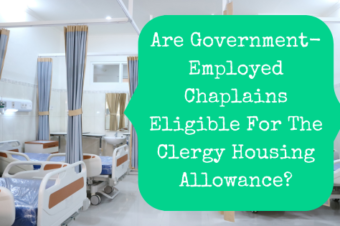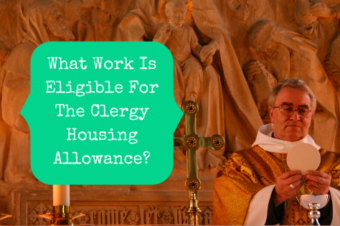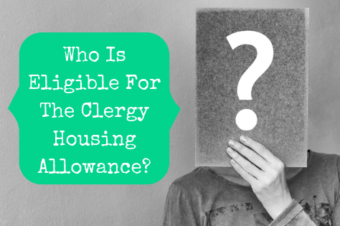
The clergy housing allowance is touted as the greatest tax benefit available to pastors. And it really is a great benefit. I learned back in 2019, though, that it can have a dark side. Not a Darth Vader using the Force to crush you kind of a dark side, more like a “If I hadn’t claimed so much, I’d be $1,000 richer” kind of dark side. The problem is how it can affect the Additional Child Tax Credit, which is a major benefit for pastors with children.
How The Clergy Housing Allowance Affects The Child Tax Credit
One of the provisions of the tax reform that passed 5 or so years ago, one of the few points that everyone liked, was the doubling of the Child Tax Credit (CTC). Kids used to be worth $1,000 each and now they are worth $2,000. That still doesn’t feel like enough when your child is laying on the floor screaming, but hey, it’s something, so let’s be thankful for it.
The CTC is credited against your federal income taxes. On your Form 1040, you add up all your income, subtract the standard or itemized deduction, and end up with your taxable income. That taxable income determines your federal income tax. The CTC is then subtracted from the tax so that you won’t have to pay as much.
Income
-Standard/Itemized Deduction
=Taxable Income
Income Tax
-Child Tax Credit (and other credits)
=Taxes Due
The housing allowance lowers your taxable income, which lowers your federal income tax. In fact, I know a lot of pastors are able to completely erase their taxable income between the housing allowance and deductions. No income means no tax due, which means you don’t get to take advantage of the CTC.
But why does that matter if you’ve eliminated your tax bill anyway?
How Income Affects The Additional Child Tax Credit
It doesn’t, really. What matters is the Additional Child Tax Credit (ACTC). The ACTC is the refundable portion of the CTC. That means that it isn’t simply used to cancel out part of your tax bill. The government will actually give you the money, even if you didn’t owe any income taxes in the first place.
On your 2022 tax return, up to 75% of the CTC qualifies for the refundable ACTC. That means the government is willing to pay you up to $1,500 per child. If you have a big family, that is a big deal.
Where the housing allowance comes into play is that your ACTC is limited by your income. It is limited to 15% of your income over $2,500. So, if you use the housing allowance to reduce your income, you also reduce your eligibility for this refund.
Taxable Income
-$2,500
x15%
=Limit on Additional Child Tax Credit
How It Plays Out In Real Life
(This is for illustrative purposes only and does not include things that are immaterial to the subject at hand, such as self-employment taxes and the deductible part of them.)
Let’s say you’re married, you have three children, and you earn $50,000 a year. You take half of that as taxable income and half as a tax-exempt housing allowance. Your tax return would show $25,0000 as income that would be completely eliminated by subtracting the $25,900 standard deduction. So, after the deduction you show no income and, therefore, no income taxes are due.
If you don’t owe income taxes then you can’t take the CTC. However, the ACTC is still available to you. The maximum that you could be eligible for is $4,500 (3 kids x $1,500). But there is still that income limitation.
To calculate your ACTC, you first take your earned income, which was $25,000 in this example. Then subtract $2,500 and you end up with $22,500. You then calculate 15% of that amount, which is $3,375. That is your ACTC. In this example, your housing allowance cost you $1,125 in ACTC ($4,500-$3,375).
$25,000
-$2,500
x0.15
=$3,375 maximum ACTC allowed
What would happen if you had only taken $15,000 as a housing allowance instead of $25,000? On Form 1040 you would have ended up with $9,100 of taxable income ($35,000 income – $25,900 standard deduction). The income tax on that is $908. However, the CTC would have canceled that out and you would not have ended up owing any more than before.
How does the lower housing allowance affect the ACTC?
$35,000
-$2,500
x0.15
=$4,875 new maximum ACTC allowed
Your new limit is $4,875, which is more than the $4,500 you are eligible for. So, lowering your housing allowance increases your ACTC to $4,500. That’s $1,125 more that you get back without increasing your tax bill at all. What could you do with an extra $1,125?
What Should A Pastor Do?
Remember, the clergy housing allowance is a benefit available to you. There is no requirement that you take it. The IRS isn’t going to come after you, mortgage statement in hand. You don’t have to claim a housing allowance and you shouldn’t if it is costing you money.
If you have kids and a lower income, you really need to look into this. Check your 2022 tax return to see if you got the full Additional Child Tax Credit. If not, play around with the numbers. Calculate your tax bill with different housing allowance amounts to see how the final results are affected. Now is a great time to do it since you can use your 2022 return numbers to determine how much of a housing allowance you should be taking in 2023.
Remember, the Bible says that children are a blessing. So let’s make sure you get all of the financial blessings you’re entitled to!




28 Responses
Shannon
May 20, 2019Wow, that’s great information. I’d noticed the ACTC not being effective for us but wasn’t able to chase down why. Had to file an extension for 2018, and I’m thankful to have this information to work with as I complete it. Thank you!
Amy
May 20, 2019You’re welcome, Shannon. I’m so glad to be able to help you! Hopefully this information will help you maximize your refund for 2018.
Evelyn
March 20, 2023I’m interested in being updated and informed so i can make good decisions
Matt
January 15, 2020The housing allowance benefit didn’t help us at all in 2018. I did a mock return as if I didn’t do any housing allowance, and I would have come out better without using it. I didn’t even think to reduce it for 2019 and get more of the ACTC. My wife will be earning some money in 2020, but we have no idea how much, which makes it more of a guessing game. I thought about upping my housing allowance this year but decided against it. Another factor to keep in mind, though, is eligibility for health insurance, since housing is not calculated for those purposes. You wouldn’t want to reduce your HA to the point that you get bumped out of eligibility for your health insurance.
Amy
January 15, 2020Those are excellent points you make, Matt. I hope you can get your numbers to a place where you maximize all tax benefits available to you. One thing to remember is that you are able to change your housing allowance throughout the year. If you run the numbers in June and find that you would be better off claiming a lower housing allowance, you can always change it for the remainder of the year.
Matt
January 15, 2020Can I just choose to not claim some of my designated housing allowance when I do taxes? I know I can’t claim more than is designated, but can I claim less, even if I did use it? Like, let’s say my optimum tax benefit is to claim 20,000 in HA when my pre-designated amount was 25,000 and I actually spent 24,000. Can I just claim 20,000 anyway to get the best tax benefit? I don’t see why not.
Amy
January 17, 2020Matt, I’m not sure how the IRS views this. I can’t imagine them looking into your expenses and trying to make you claim a higher housing allowance, though. It would be best to consult a tax professional on this one.
Pat
January 17, 2020Can a pastor claim housing allowance if they receive no income from the church?
Amy
January 17, 2020Pat, The housing allowance is limited to the pastor’s ministerial compensation. If the church gives you nothing, then you cannot claim a housing allowance. If they are able to pay you something, you can claim the entire amount as a housing allowance and it would all be excluded from federal income taxation.
Galisha
April 13, 2023My husband’s entire income is designated as housing allowance. Is there any way to report it on taxes without having to pay taxes on it? We have been trying to get a mortgage for years, but can’t seem to find a way to show his housing allowance as an income we have.
Jon
April 14, 2023I would suggest looking at different lenders. We have done the same thing for years and have never had issues.
Amy
April 23, 2023The only way you would report it is if you are paying Social Security on it. Showing your actual pay stubs to the mortgage lender might help. I wrote a letter for someone once as a “subject matter expert” explaining how the housing allowance works to help a minister get a mortgage. If you email me directly I could help you with that.
Jonathan Brooks
March 11, 2020The tax code states that a pastor’s salary and housing allowance is considered Earned Income for purposes of the Earned Income Credit. So, it seems both should also count for ACTC, but the form fails to a provide a space for a pastor to include their housing. I spoke with a tax professional who said the tax form (8813 and 972, page 10) don’t match the tax code concerning earned income for pastors. I’m trying to get to the bottom of this. But both combined should definitely be earned income.
Amy
March 11, 2020Yes, the way the forms and instructions work, there is no way to include the housing allowance as income for the child tax credit. In fact, on page 5 of IRS Publication 972 (https://www.irs.gov/pub/irs-pdf/p972.pdf) it states that earned income only includes taxable earned income and nontaxable combat pay. I’m not aware of any way to include the housing allowance.
Jon
February 5, 2021Hey Amy! Love your stuff!
Just to ensure I’m seeing things the same way – Is this article technically out-of-date? Other sources seems to say that from 2019 and on this changed, so the phase out now is not an issue (only at high income levels). Therefore the 15% limiter shouldn’t be an issue now. Or am I understanding this inaccurately?
https://turbotax.intuit.com/tax-tips/family/what-is-the-additional-child-tax-credit/L4IBvQted
Amy
February 9, 2021Jon, what you are reading is that the upper-end income phase-out is no longer an issue, which is correct for couples earning under $400k. The issue I am addressing here is pastors who have such LITTLE taxable income that it limits their child tax credit.
Pastor Lainey
March 15, 2021I’m not understanding how the housing allowance is a benefit when you have to pay self-employment taxes on it?
If I use all of my housing allowance for expenses, is it not a “washout”?
Amy
March 15, 2021Pastor Lainey, it’s a benefit because you don’t have to pay income taxes on it. Let’s say you earn $50k and are in the 12% tax bracket. Without the housing allowance, you would pay self-employment taxes on the whole amount plus $6k (12% * $50k) of income taxes. If half of that ($25k) is designated as a housing allowance, you still pay the same amount of self-employment taxes but only $3k (12% of $25k) of income taxes. Your self-employment taxes and housing expenses are the same either way, but with the housing allowance you pay less in income taxes to end up ahead.
Pastor Lainey
March 15, 2021Thank you — I think my problem is that I didn’t pay self employment taxes so now i’m stuck with paying huge tax liability at end — hard lesson learned
Amy
March 16, 2021Ouch! I’m sorry about that!
Tim
September 17, 2021Any update to this topic with the recent changes to the CTC? I know the amount has changed ($3,600 or $3,000 depending on age), but I believe it is also fully refundable. This would mean that you no longer have to publicly apologize for saying there is no downside to taking the housing allowance! I believe the ARA is what made this fully refundable and it is an unknown if the larger amount, advance payments, and fully refundable rules will continue into 2022.
Amy
September 20, 2021Tim,
The CTC was increased and made fully refundable for 2021. Based on the recent proposal in Congress, it looks like they want to make it permanent. That hasn’t passed and become law yet, so at the moment the only official change is for 2021. I will be watching it closely, though, as the new tax bill makes its way through Congress.
Brennan
March 20, 2023I’m a bit confused. In the example given above of a pastor who earns $50,000, in addition to his federal income tax liability (however limited that may be because of his housing allowance), wouldn’t he still have several thousand dollars worth of SECA taxes as well? And couldn’t he use the CTC ($2,000 per child) and apply it towards his SECA liability? It seems to me that unless someone has 4-6 children AND a very small income, the ACTC would rarely apply because of how much SECA taxes pastors have to pay, right?
Amy
April 9, 2023The Child Tax Credit is applied before SECA is added in, but the Additional Child Tax Credit can help to offset SECA. This has a greater impact on the pastors who have opted out of SECA.
Bokman Han
May 3, 2023Hi, Amy!
Thanks for your post. It upgraded my understanding of the housing allowance for pastors.
I’m a pastor and enrolled agent, helping Korean churches and pastors in US. (solomontax.net)
Is it ok for me to translate and share your post with Korean pastors?
Blessings!
Amy
May 8, 2023Yes, please just include the proper attribution. Thanks for your work helping the Korean churches!